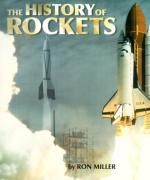|
This section contains 1,281 words (approx. 5 pages at 300 words per page) |

|
Three important developments during the first half of the twentieth century laid the foundation for both modern rocketry and careers within the field. The first was the inspired scientific and engineering work performed by Robert H. Goddard on solid propellant rockets, and subsequently on liquid propellant rockets, during the years 1915 through 1942. Remembered as the "Father of Modern Rocketry," Goddard was a physics professor at Clark University in Massachusetts. Working mostly alone, with limited funds, he built and launched experimental solid and liquid propellant rockets and established the physical principles that enabled future rocket development to proceed.
 Robert Goddard, one of America's first rocket sci-entists, poses with one of his rockets at Roswell, New Mexico in 1938.
Robert Goddard, one of America's first rocket sci-entists, poses with one of his rockets at Roswell, New Mexico in 1938.
The second event took place in Germany in the early 1930s. Goddard's work generated little interest in the United States, but it excited a small organization of young German...
|
This section contains 1,281 words (approx. 5 pages at 300 words per page) |

|


